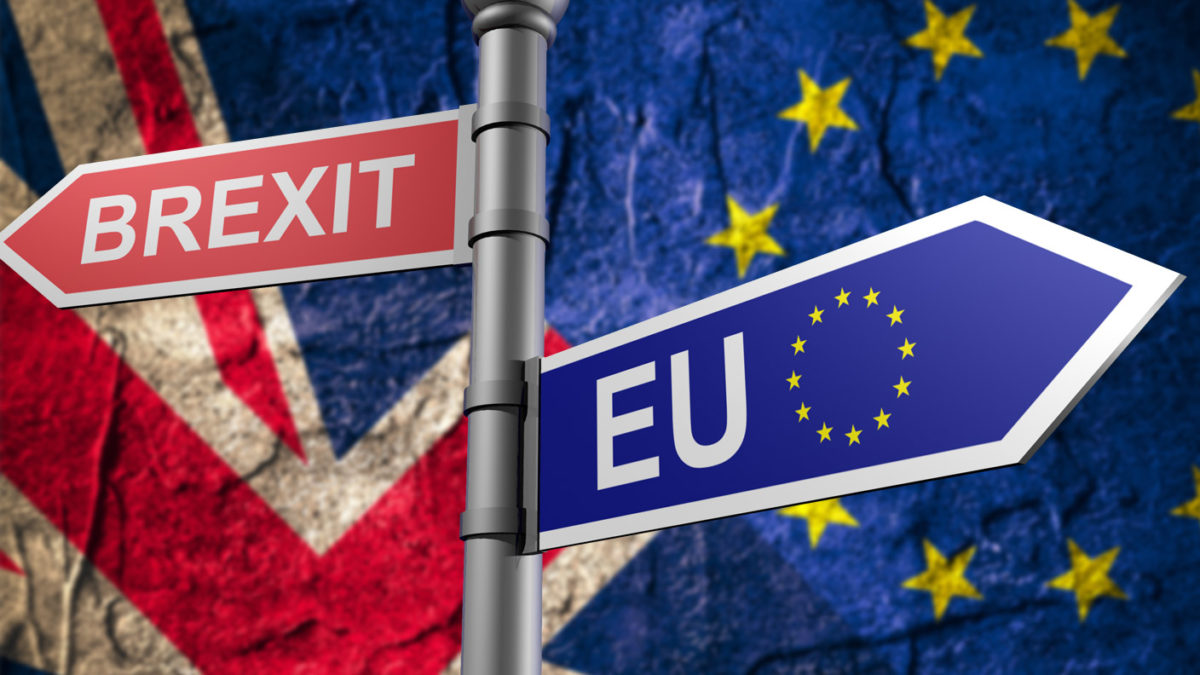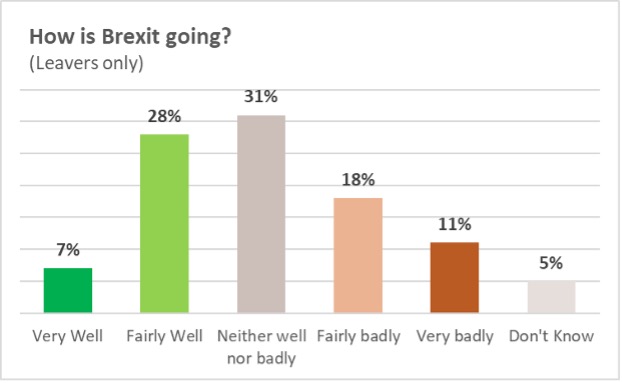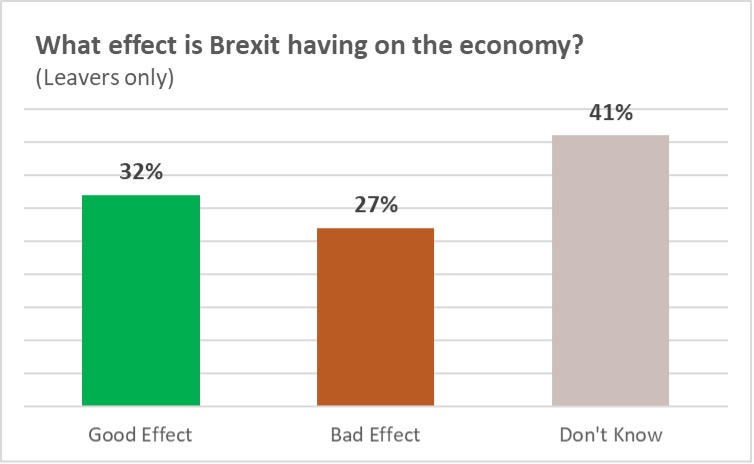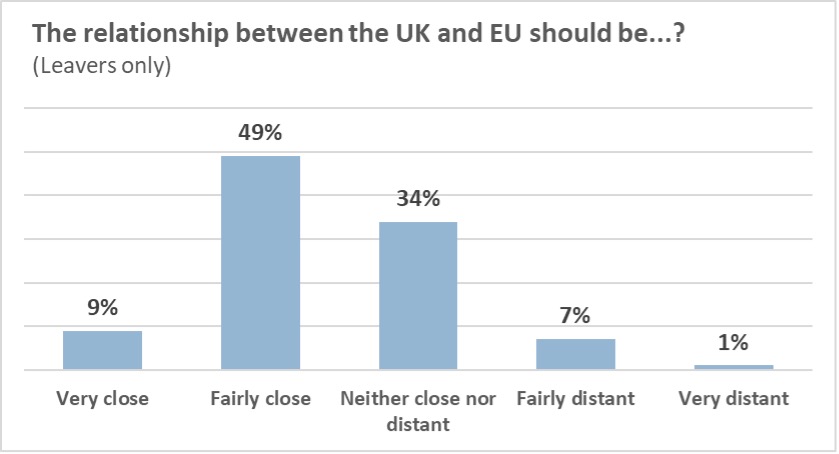Is the Leave vote becoming more fragile? Christabel Cooper takes a deep dive into public opinion on Brexit
While the ‘top line’ polling figures might imply little change, there are signs that support for Brexit is becoming more fragile. In this guest post for Brexit Spotlight, Christabel Cooper surveys the latest data.

It is over a year and half since Britain officially left the EU and just over nine months since the transitional period ended. It has been a bumpy ride, with furious disagreements over the operation of the Northern Ireland protocol and Britain currently experiencing labour shortages closely related to the end of EU freedom of movement. Given the acute problems Brexit has presented to the UK’s supply chains, labour market and exporters dependent on trade with Europe, this seems like a good time to consider how voters, and in particular Leave voters, are feeling about Brexit.
Relatively few people have changed their minds
A YouGov poll at the beginning of September showed that 48% now think it was wrong to leave the EU, and only 39% think it was right. Consistently over the last few years, around 10% of Leavers say they have changed their minds and support Remain, but the relatively low support for Leaving in this particular poll was driven by a further 8% saying they “Don’t Know”, rather than having completely changed their minds. It is worth noting that 8% of Remain voters now think it was right to leave the EU.
But even though more people now think it was wrong to leave the EU, there is still a narrow majority who would prefer to stay out, rather than go through the process of re-joining.
Leavers did not expect to take an economic hit from Brexit. Some are disappointed in the government’s handling of Britain’s exit from the EU
Most Leavers did not vote for Brexit for economic reasons. This does not mean, however, that they were prepared to take an economic hit in order to achieve their other goals. The vast majority of Leavers have always believed that Brexit would either benefit the economy or would not have an impact. For example, polling undertaken for What Britain Thinks: EU annually between 2016 and 2021 consistently found these two groups (“benefit” or “not much difference”) to represent about 80% of Leave voters (see page 22 of this report). This potentially makes their support for Brexit vulnerable, if they come to believe that leaving the EU has caused serious economic damage.
This is reflected in the fact that Leavers are now divided as to whether Brexit is going well or not. A YouGov poll at the end of September found that around a third think it is going well, a third think it is neither going well nor going badly, and another third think it is going badly, or don’t know. The same splits are evident in views about the current economic impact of Brexit with 32% thinking it has had a good effect and 27% a bad effect at the end of September this year.


More Leavers tend to blame the EU more than they blame the government for this – a third think the government has handled Brexit badly, but 62% think the EU is also at fault.
Most Leavers would like a “fairly close” relationship with the EU and a majority of Leavers could potentially be persuaded to remain aligned with EU rules in some areas
If a significant number of Leavers have doubts about how Brexit is going, what is the alternative? In January 2021, a report from What the UK thinks: EU found that a majority of Leavers wanted a very close, or fairly close, relationship with the EU.

A deliberative exercise was also carried out in November 2020 by UK in a Changing Europe and NatCen. The organisers polled participants before and after a discussion about whether the UK should continue to follow EU regulations on roaming charges, flight compensation and food labelling. After the discussion, a majority of Leavers said that they now supported alignment – a remarkable result given how much “taking back control” over laws and regulations was emphasised during the Brexit campaign.
Attitudes towards immigration are becoming more liberal, and immigration has fallen as an issue of concern
So, what about immigration which was probably the most important issue driving the Leave vote? A recent report from the think tank British Future showed that attitudes towards immigration have become more positive from 2015 onwards (i.e., this trend began prior to the EU referendum). Remainers are significantly more positive than Leavers, but 31% of Leavers now believe migration has had a positive impact on the UK.
There is also a continuing trend of fewer people wanting to see the numbers of immigrants reduced, down from 67% in 2015 to 45% in July 2021, although most Leavers still want to see numbers down (69% think it should be reduced, 48% that it should be reduced by a lot).
Immigration is also seen as being a less important issue than it once was – from having been the top issue in 2015, the latest Ipsos Mori figures show it is in 7th place behind Covid, the NHS, the economy, climate change, Brexit (in general) and inequality with only 16% of respondents mentioning it.
However control of immigration remains popular and there is still resistance to freedom of movement
The British Future report stated that more people favoured an immigration system which gave people control over who came into Britain, rather than focused on just reducing numbers. In a poll which predated the full impact of the HGV driver shortage, 65% of all voters agreed that employers should be able to recruit from overseas for any job where there are shortages (51% of Leavers agreed) and 55% support recruitment even for low skilled jobs which are harder to fill (37% of Leavers agreed).
Nevertheless, there is still very strong opposition to reintroducing freedom of movement among Leavers, with over 80% opposed. Although when asked whether it would be a good idea to allow freedom of movement in return for British companies being able to sell their goods freely in the EU, around a third were positive (Source: What the UK Thinks: EU)
Attitudes to immigration may well become even more positive as a result of the labour shortages the UK is currently enduring – although this depends on whether the government narrative that EU immigration was responsible for low wages makes an impact with the wider electorate.
Conclusion
In summary, what should we conclude from this picture? Clearly, attitudes to Brexit are still relatively polarised. Most Leavers still believe leaving the EU was the right thing to do. Remainers do not. Yet, the Leave coalition is very split as to whether the current version of Brexit is going well, with around a third who think it is going badly and who blame the government (at least in part).
Most Leavers are in favour of a fairly close relationship with the EU, which the current Brexit deal does not provide, and are surprisingly open to the possibility of aligning with EU rules in some areas. Leavers overall are still negative about immigration but attitudes are moving in a more liberal direction. A less restrictive policy (though not full freedom of movement) could be acceptable to many Leavers.
If the economic situation in the UK worsens, and crucially if this is attributed (at least partly) to Brexit rather than just to the after-effects of the pandemic, then the vast majority of Leavers who did not expect any economic damage from leaving the EU may well be disappointed.
So, in general, this gives political parties considerable electoral scope to argue for a new, closer and more economically beneficial relationship between the UK and EU – and provides campaigners with opportunities to push for this, both from the government itself and among opposition parties.
October 12, 2021
Brexit Spotlight is run by Another Europe Is Possible. You can support this work by joining us today. The website is a resource to encourage debate and discussion. Published opinions do not necessarily represent those of Another Europe.





